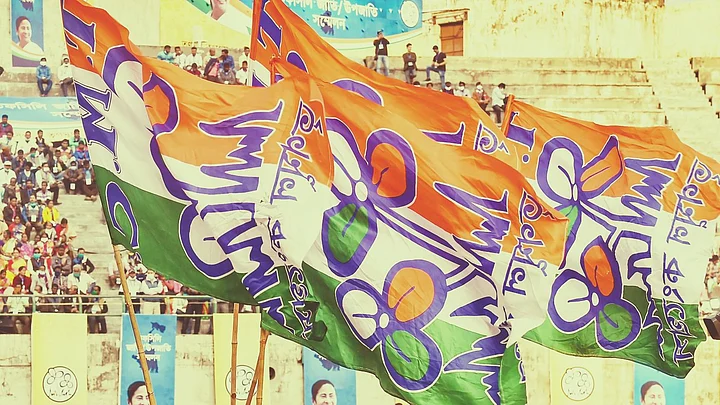After registering a thumping victory for the third time in West Bengal, the Mamata Banerjee-led Trinamool Congress is once again trying to expand the party in other states, and its main focus has been Tripura, where Assembly elections are due in early 2023. The TMC, which is mostly a Bengali party, sees the northeastern state, where Bengalis are a majority, as a favourable ground.
The TMC debuted in Tripura’s electoral politics way back in the Lok Sabha election of 1999, where it fought along with the BJP. The National Democratic Allliance got crucial support from the Tripura Upajati Juba Samiti (TUJS), then a major non-Left tribal party.
Former Chief Minister Sudhir Ranjan Majumdar was made TMC’s face, who contested from the Tripura West Constituency. Its ally BJP contested from the Tripura Eest Constituency, an ST-reserved seat, and the candidate was Jishnu Deb Barman, the current Deputy Chief Minister of the BJP government. Although the NDA failed to win any seat, it got 27.3% votes against 56.2% of CPI(M). The TMC emerged as the second-largest party by fetching 14.5% votes, while the BJP got 12.8%; the Congress was reduced to mere 7% votes.
As it happened, Sudhir’s love for the TMC didn’t last long and he joined his parent party, the Congress, which regained its position as the main Opposition party in the 2003 state Assembly polls. The TMC contested along with the BJP, which fetched 1.3% votes. The TMC got a meagre 0.4%. In the 2004 Lok Sabha polls, the TMC garnered 5.1% votes, while its ally BJP secured 7.8% votes. The TMC later contested elections alone, but it failed to leave any mark and remained in the wilderness.
Renewed Attempts After 2011 & 2016 Wins
After its historic victory in the 2011 West Bengal polls, the party sent senior leader Mukul Roy to rebuild the organisation, but it failed to get any major response in the state. It was only after the 2013 assembly polls, which saw the return of the CPI(M)-led Left Front under the leadership of then Chief Minister Manik Sarkar for the fifth consecutive time, that it got some breakthrough with the joining of senior Congress leaders like Ratan Chakraborty, Jawhar Saha and Surajit Datta. These leaders were unhappy with Sudip Roy Barman, who was the Congress’s face in the polls. The party grew, and in the 2014 Lok Sabha polls, it garnered 9.7% votes. However, due to the BJP’s historic victory under the leadership of Narendra Modi, the TMC’s growth hit a roadblock.
After the TMC’s second Bengal win in 2016, it again increased its focus and was successful in poaching six Congress MLAs led by Sudip, the current disgruntled BJP leader.
Despite all the hype it generated, the TMC didn’t benefit massively after the joining of the Sudip camp. The BJP was already emerging as the main opposition party. As a result, the Sudip camp, whose differences with the TMC high command grew with time, thought it better to join the BJP within one year, resulting in the complete collapse of the TMC.
Wooing Congress leaders and TIPRA
Recently, Subal Bhowmik, who has been in the political wilderness after the 2019 polls, joined the TMC after leaving the Congress. He has been known for having changed parties frequently in the last decade. After the Congress failed in 2013 polls, he formed his own unsuccessful Tripura Pragatishil Gramin Congress, which even tried to ally with the TMC. Later in 2015, he merged his party with the BJP and then left the saffron party to join his parent party, the Congress, in 2019.
The party is even trying to lure royal scion Pradyot Barman’s TIPRA Motha, which won the tribal body polls held this year by defeating the ruling BJP-Indigenous Peoples Front of Tripura (NC) fragile coalition. However, Pradyot, who is more ready to deal with national parties (read the BJP and the Congress), has made it clear that his front will align only with a party that agrees to his Greater Tipraland demand, which isn’t viewed positively by the majority Bengalis. The BJP, the CPI(M) and the Congress oppose this. It is highly risky for the TMC as well, which is eyeing the Bengali votes, to support the demand.
TMC Needs To Step UP
Presently, the party’s hope lies in the rising anti-incumbency against the BJP in the state. True, the ruling party has seen a drop in its popularity due to governmental issues, organisational weakness and internal dissent, but in the plain areas, which are dominated by Bengalis, the BJP is still ahead. However, it is facing a challenge
from the main opposition, the CPI(M), which has been consistently organising protests against the saffron party.
In tribal areas, the fight is mainly between the TIPRA Motha and the BJP, with the CPI(M) and the IPFT(NC) in the scenario as well.
The TMC’s history in the state clearly shows that it can emerge as a major player in the state’s politics. But a big challenge is its ability to retain its base. The uncertainty of the past will haunt the party, and to overcome this, it has to think beyond banking on Bengal’s leadership; it must build its non-existing organisation along with cultivating a credible face in the state. As of now, the most likely scenario for the TMC is that it can emerge as a third force pushing behind the Congress in the Bengali-dominated plain areas against the BJP and the CPI(M), with the likelihood of dividing the anti-BJP votes.
(Sagarneel Sinha is a freelance writer from Tripura who writes on politics, foreign affairs and Indian mythology. He tweets @SagarneelSinha. This is an opinion piece and the views expressed above are the author’s own. The Quint neither endorses nor is responsible for the same.)
